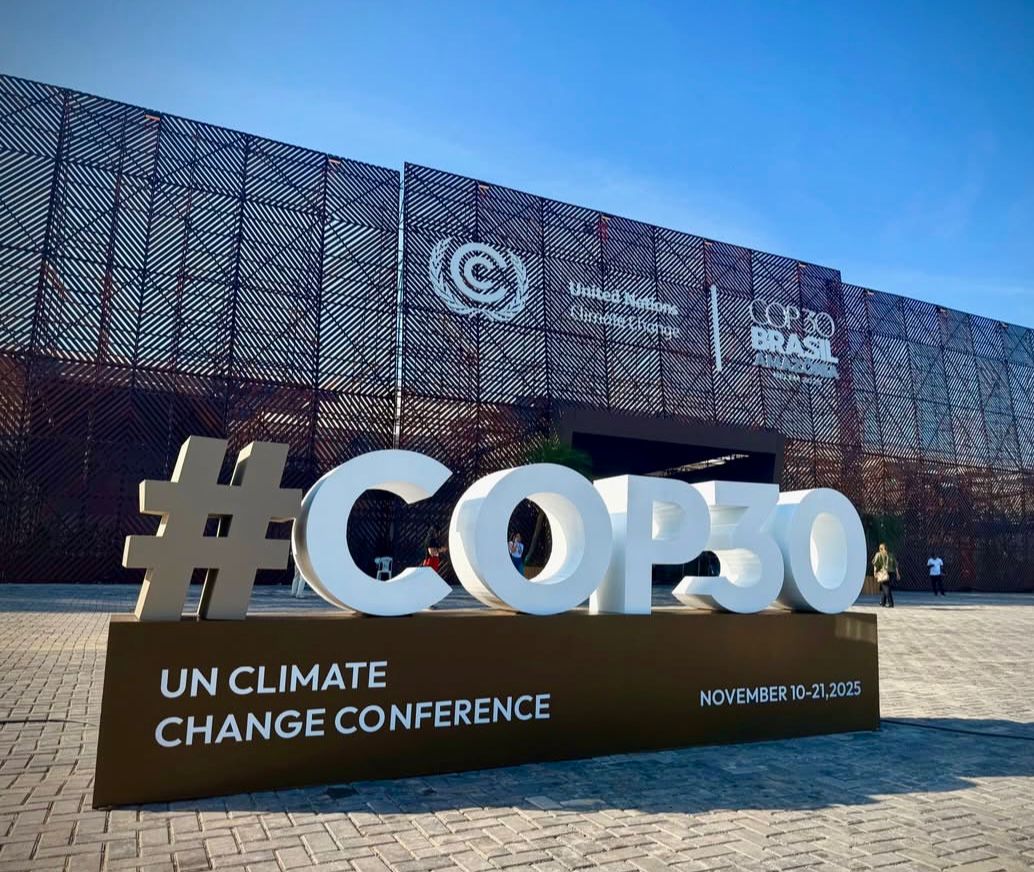As the world gathered in Belém, Brazil, from 10-21 November 2025, for the 30th United Nations Climate Change Conference, ICLEI Oceania brought the voices, priorities and solutions of local and subnational governments from across the region to the world’s most important climate forum.
The journey to Belém: Building momentum through Town Hall COPs
The groundwork for ICLEI Oceania’s presence at COP30 began months earlier through innovative Town Hall COPs – locally driven climate dialogues that connected residents, local leaders and national representatives to chart pathways for stronger climate action. These forums were instrumental in shaping community-led inputs that directly informed both national climate commitments and the global negotiations in Belém.
Greater Sydney led the charge in March 2025, hosting one of the year’s first Town Hall COPs. Using a Talanoa Dialogue format (a Pacific approach to inclusive conversation), 16 local councils across the region gathered to align local climate priorities with Australia’s Nationally Determined Contributions (NDCs). Elizabeth Adamczyk, Councillor for the City of Newcastle and Chair of the ICLEI Oceania Regional Executive Committee, emphasised that these forums created ideal opportunities “to mobilise locally, bringing together diverse stakeholders to influence national, regional and global outcomes for inclusive, bold climate action.”
This momentum continued with the Greater Adelaide Town Hall COP in October, which directly fed South Australia’s climate adaptation priorities into the UNFCCC process. The dialogue outcomes from both summits were presented at COP30 through multiple channels, including ICLEI’s Cities & Regions Hub and the Australian Pavilion in Belém, ensuring that local voices from the region are at the heart of transformation.
Perhaps most significantly, ICLEI Oceania facilitated the first Pacific Town Hall COP in Kiribati in August, which produced the Ikarekebai Declaration, a powerful statement of collective responsibility that echoed COP30’s Brazilian concept of mutirão (neighbours and communities coming together for a common good). The Declaration underscored the existential climate threat facing island nations and their communities, bringing urgent Pacific perspectives directly to the global stage. Honourable Ruth Cross Kwansing, Minister for Women, Youth, Sport and Social Affairs for Kiribati, in presenting this at a high-level session, made the point that climate action needs to be “inclusive, locally driven and anchored in the realities of our people”.
The LGMA's unified voice at COP30
Ahead of COP30, the Local Governments and Municipal Authorities (LGMA) Constituency –the recognised voice of cities and regions in UN climate negotiations, with ICLEI as the Focal Point – published a Joint Position calling for a legacy of multilevel implementation and an explicit recognition of urbanisation in outcomes language, signals that cities, regions and their communities are not just stakeholders but co-implementers. Networks worldwide were invited to endorse the position, reinforcing a united municipal front.
As ICLEI’s Director of Global Advocacy Yunus Arikan emphasised: “If COP30 is to be remembered as the implementation COP, then we need more than ambitious words – we need the structures that make delivery possible.”

ICLEI Oceania in action at the Rio Local Leaders Forum and COP30
Throughout the conference, ICLEI Oceania’s Regional Director, Kobie Brand, and leaders from the Region showcased the impactful work already happening in Oceania.
Adelaide’s Lord Mayor Jane Lomax-Smith, who attended the Rio Local Leaders Forum (LLF) prior to COP – in an interview with The New York Times’ award-winning global climate reporter – spoke about South Australia’s climate leadership, bringing the state’s renewable energy transformation story to international attention. During the session, Adapting Cities to Extreme Heat and Reducing Emissions at COP30, Lord Mayor Lomax-Smith importantly underscored the equity dimensions of urban heat.
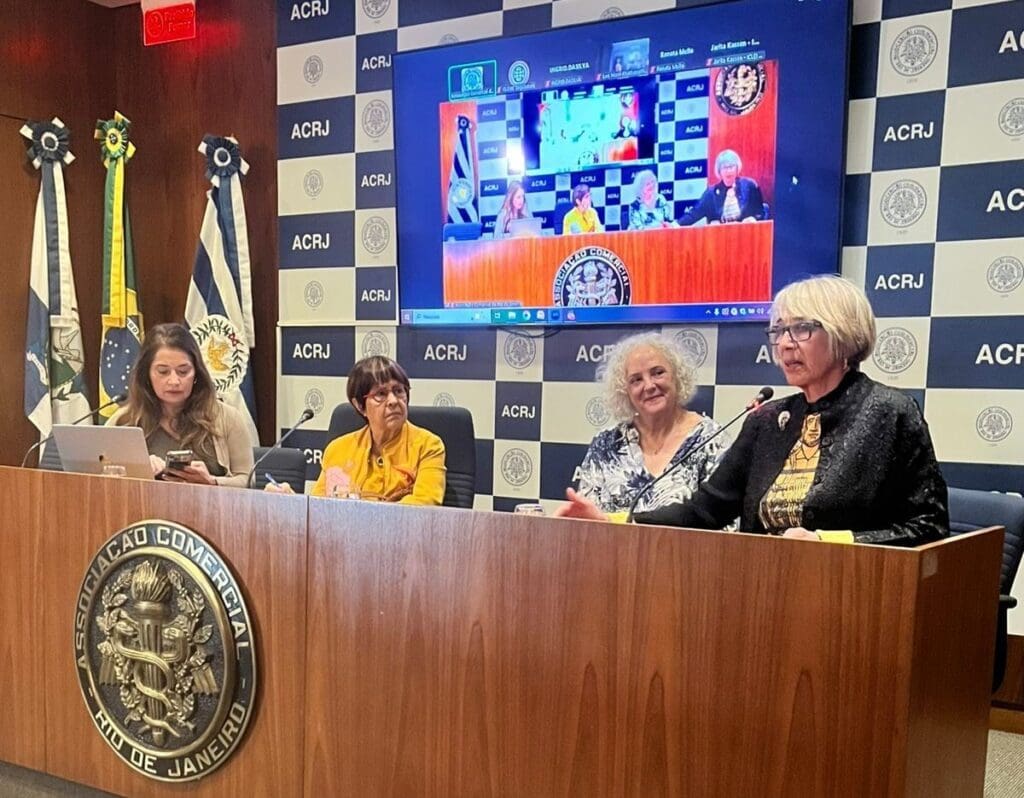
Meanwhile, Hobart’s Lord Mayor Anna Reynolds, an ICLEI Oceania Regional Executive Committee member and serving as one of 16 co-chairs of the LLF, emphasised the critical role of cities: “Cities like Hobart are already experiencing the impacts of climate change. As co-chair of the COP30 LLF, I’m working alongside other local leaders to protect our communities and natural environment. We have the unique opportunity to learn from one another and demonstrate that cities – no matter their size – can lead the way in building a safer and more sustainable future.”
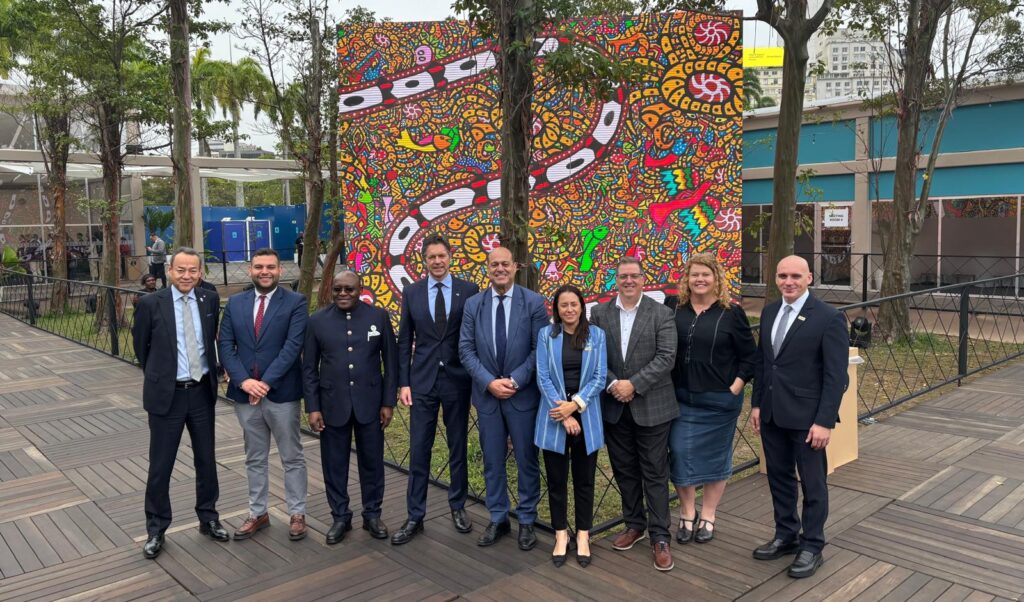
Speaking on coastal issues across the region, Moira Were, Mayor of the City of Onkaparinga and ICLEI Oceania Regional Executive Committee member and Global Executive Committee representative, brought a powerful message about ocean health and community action to COP30. “The ocean is asking for our attention. And communities are already speaking back with care, creativity and courage. The work now is to ensure political leadership listens – and acts,” Mayor Were stated, capturing the urgency felt by coastal councils witnessing first-hand the impacts of climate change on marine ecosystems and shorelines. Her perspective resonated strongly in Belém, a city at the mouth of the Amazon River where freshwater meets the Atlantic – a vital reminder that climate action must encompass both terrestrial and marine environments.
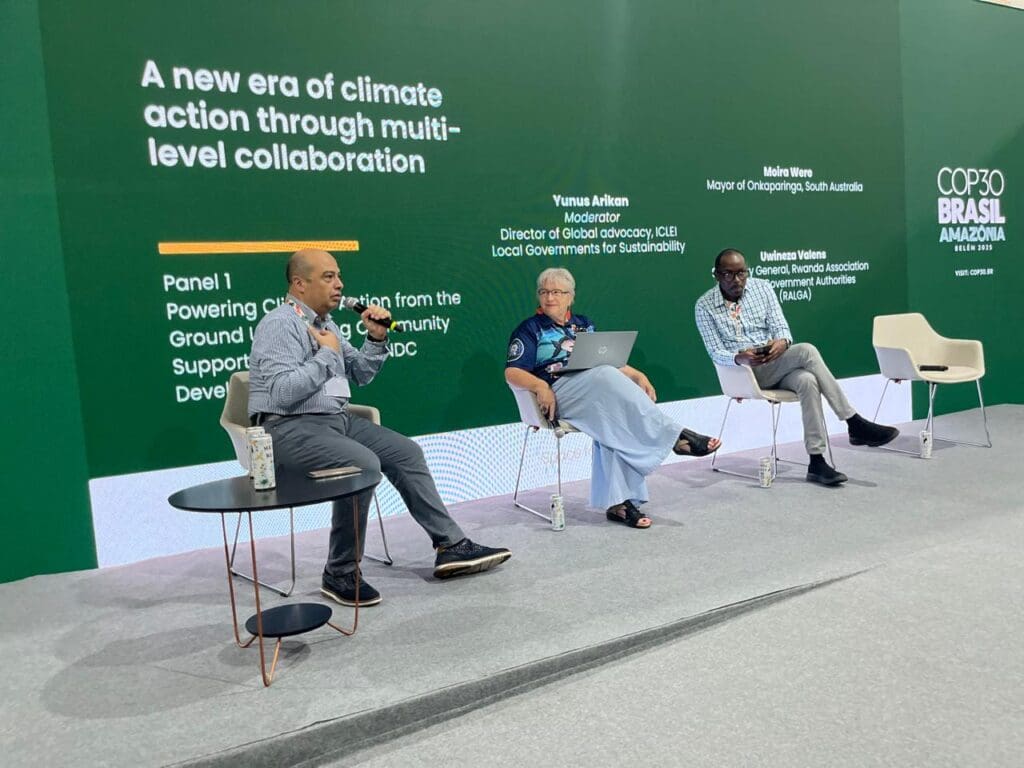
By bringing local perspectives into these global conversations, ICLEI Oceania ensured that the unique climate vulnerabilities and innovative solutions from our region informed the “implementation COP” and shaped how climate ambition is delivered in practice.
Leading the way toward COP31 and beyond
ICLEI Oceania’s engagement at COP30 carried additional significance given Australia’s bid to co-host COP31 in 2026 in partnership with Pacific nations. The Pacific’s unique climate vulnerabilities – from rising seas threatening low-lying island nations to extreme weather events impacting communities – position the region as both a critical voice in global negotiations and a showcase for climate adaptation and resilience solutions.
ICLEI Oceania’s recent launch of its Pacific Islands office in Suva, Fiji, underscores the organisation’s commitment to amplifying Pacific perspectives in international forums and recognising that island nations are on the frontlines of climate change.
Speaking in a session titled “A new era of climate action through multilevel collaboration”, Mayor Moira Were reiterated: “This is the time where as a world community we need to act as the best neighbours we can be to the peoples of the Pacific…It is the oceans that unite us and bring us together and we know, like the Pacific, the centrality of the ocean to our shared future.”
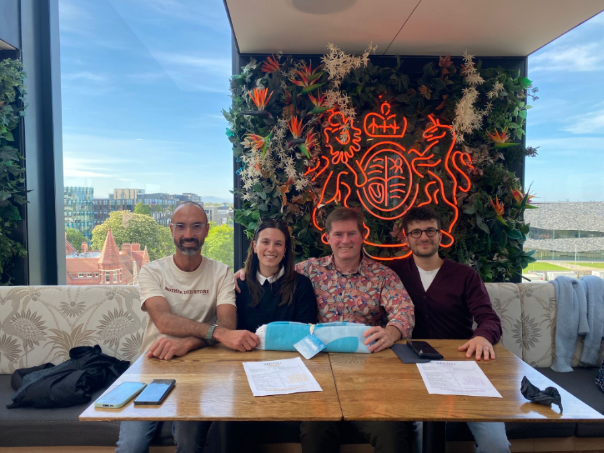
Thanking ICLEI for having galvanised and focused what cities have to do to get delivery of policy, Adelaide’s Lord Mayor, Jane Lomax-Smith, said: “In the coming year, whether or not we get COP31, we need a runaway to COP31, where we talk to our citizens and get a social license for more reform… We would want to invite First Nations people, Pacific Islands communities, and we also want to engage the youth.”
After it was announced that Australia would not be playing host to COP31, Kobie Brand reiterated: “ICLEI Oceania remains steadfastly committed to strengthening climate action and elevating the voices of local and subnational governments across our vast and varied region. The need for urgent and decisive scaled implementation is clear, and together with many local and international partners, ICLEI Members, and all levels of government, we continue to move forward boldly with renewed momentum.”
The implementation imperative
COP30 was dubbed the “implementation COP” by the Brazilian Presidency, and this framing resonated deeply with ICLEI Oceania’s approach: advancing a clear message that implementation happens locally, coupled with multilevel collaboration. Cities and regions are where national climate commitments come to life – where renewable energy is deployed, where buildings are retrofitted, where transport systems are transformed, and where communities adapt to climate impacts.
ADD OUTCOMES
From the Amazon to the Pacific, from Belém to a potential COP31 on home soil, cities and regions are leading the way – and ICLEI Oceania is ensuring their voices are heard, their innovations are shared, and their leadership is recognised as essential to achieving global climate goals.
